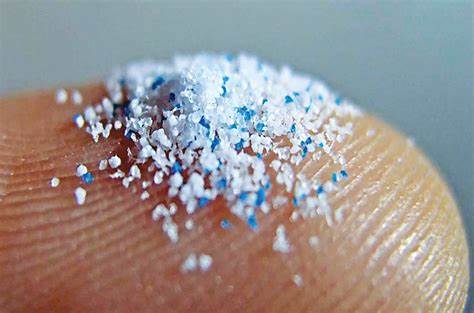Microplastics have been found lodged deep in the lungs of living humans for the first time, the London Guardian reports.
A new study, in the journal Science of the Total Environment, builds on two previous studies (here and here) which showed microplastics in the lungs of dead people under autopsy.
Tissue was taken from patients undergoing surgery and in 11 of 13 cases, microplastics were found. The most common types were polypropylene and PET.

Microplastics in the lungs

The new research used healthy lung tissue taken from sites close to surgical targets.
The researchers were able to detect and analyse particles down to 0.003mm in size. Spectroscopy was used to identify the type of plastic. Samples were compared to controls to allow background levels of contamination to be established.
“We did not expect to find the highest number of particles in the lower regions of the lungs, or particles of the sizes we found,” said Laura Sadofsky, a researcher at Hull York medical school and a senior author of the study.
“It is surprising as the airways are smaller in the lower parts of the lungs and we would have expected particles of these sizes to be filtered out or trapped before getting this deep.”
“This data provides an important advance in the field of air pollution, microplastics and human health,” she said. The information could be used to create realistic conditions for laboratory experiments to determine health impacts.
Although the study focuses on inhalation of microplastics, neither the study authors nor the Guardian’s reporting mentions the fact that polypropylene, one of the two most common types of plastic found in the biopsy samples, is a common ingredient in the disposable face masks that have become a part of everyday life during the pandemic.
A recent study, which we reported on, showed that facemasks are releasing toxic chemicals such as lead, antimony and copper upon exposure to water, and it’s not difficult to imagine that at least some of the microplastic contamination detected in the new study was as a result of direct inhalation from facemasks.
Scientists have already issued warnings about the potential for disposable facemasks to contribute significantly to the global microplastic problem, especially in the oceans, where around 1.56 billion masks ended up in 2020, according to one estimate.
Other significant sources for inhalation are likely to be found in the home. A recent investigation commissioned by the British daytime television show Good Morning Britain showed that we may be breathing in up to 7000 microplastic particles a day — 100 times the amount researchers predicted.
In response to the findings, Professor Anoop Chauhan, a respiratory specialist with Portsmouth Hospitals Trust, said: ‘There are no health benefits to inhaling anything you don’t need.
‘Things in an occupational setting – asbestos, coal or cigarette smoke or anything you inhale – has dangers and microplastics are a hidden danger in people’s homes.
‘And this is the first study that highlights the level of these that we breathe in everyday life.’
He added: ‘To date, the bulk of research has centred around pollutants outside of the home such as car emissions, but as this initiative proves, it’s essential we widen our focus on the dangers in our homes.’


Don’t hesitate to email us at [email protected] for personalized coaching and a client questionnaire if you’d like DEDICATED tailor-made personal training on strength training, building muscle, losing fat, developing athleticism, and more — all to your liking, lifestyle, habits, and taste!
Otherwise, don’t forget to claim your FREE eBook detailing how to lose 20lb of fat while building muscle in 12 weeks! You can claim it here.
Alternatively, you can pick up a FREE eBook on fundamental strength principles offering an introductory workout program.











